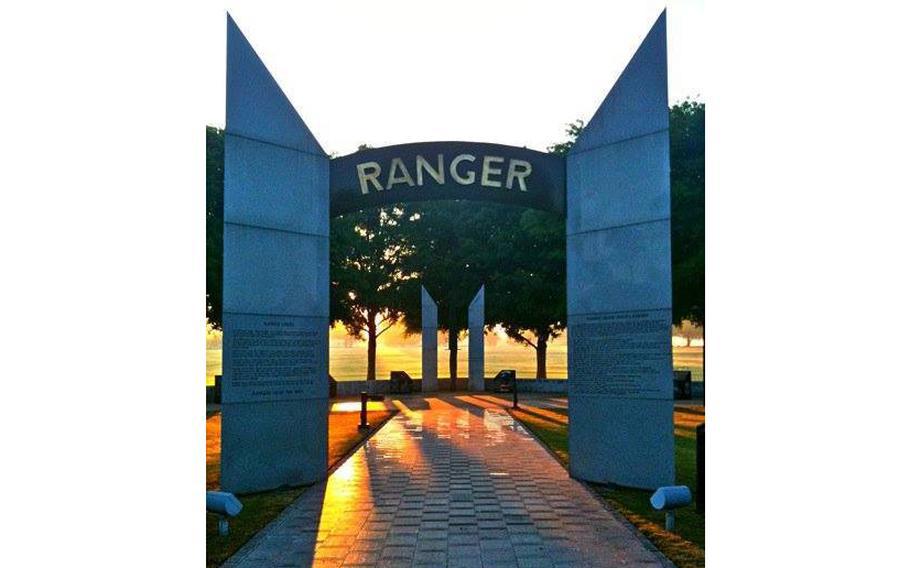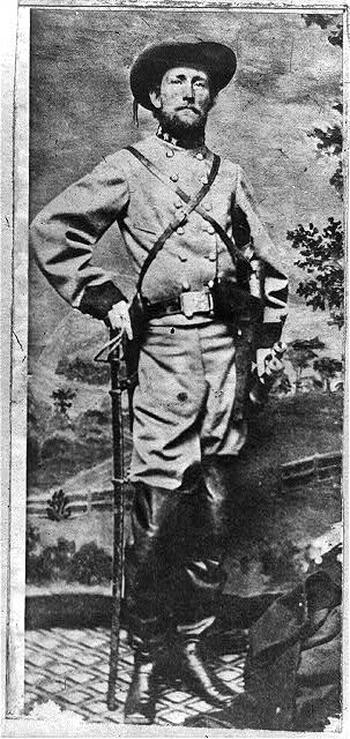
A lawsuit filed by an Army Ranger foundation seeking the reinstatement of a Confederate officer’s name to the Ranger memorial at Fort Moore, Ga., was dismissed Monday, Dec. 16, 2024. (National Ranger Foundation/Facebook)
ATLANTA — A federal judge on Monday dismissed an Army Ranger foundation’s lawsuit seeking the reinstatement of a prominent Confederate officer’s name to the Ranger memorial at Fort Moore.
U.S. District Judge Clay Land wrote he was unpersuaded by the National Ranger Memorial Foundation’s arguments that the Defense Department overstepped its authority in removing the name of Confederate Col. John S. Mosby from the Georgia post’s monument. The judge wrote the Pentagon acted appropriately and lawfully in removing Mosby’s name under the 2020 law that established a method to remove items honoring the Confederacy and those who served it voluntarily from U.S. military installations.
“It is beyond reasonable dispute that the United States Congress, consisting of the duly elected representatives of the American people, has the authority to decide whether Mosby should be memorialized and honored on a United States military installation,” Land wrote in the 24-page order issued just days after a Dec. 12 hearing in his downtown Columbus, Ga., courtroom to examine the merits of the case. “Congress has determined that he should not be, and the court finds that its determination was properly implemented by the secretary of defense.”
Mosby was an Antebellum lawyer who opposed slavery and secession but ultimately volunteered for the Confederate army out of loyalty to his family and native state of Virigina, according to his post-Civil War writings. Known as the “Gray Ghost,” Mosby commanded a cavalry battalion known as Mosby’s Rangers, which conducted daring raids on Union forces, often behind their lines. In 1992, he was inducted into the initial class of the Ranger Hall of Fame. He remains the only Confederate ever admitted into the group.

Undated photo of Col. John S. Mosby, a Confederate cavalry commander known as the “Gray Ghost” for leading daring raids on Union forces. (Library of Congress)
Last year, the National Ranger Memorial Fund, which oversees fundraising and upkeep of the memorial, sued the Defense Department and top officials, including Defense Secretary Lloyd Austin, seeking to return Mosby’s name to the monument. They argued the Naming Commission, a panel created by Congress to study and make recommendations on removing Confederate-tied items from the Defense Department, omitted Mosby’s name on the Ranger memorial and in the Ranger Hall of Fame in its massive list of items for removal in the annex of its first of three official reports.
But the commission did specifically identify Mosby’s name for removal from those items in the body of that report, which also recommended the changing of names for nine Army posts that previously were named for Confederate leaders, including Fort Moore, which was then known as Fort Benning for Confederate Brig. Gen. Henry Benning. Fort Moore is home to the Army’s Ranger School, the 75th Ranger Regiment’s headquarters, its 3rd Battalion and the annual Best Ranger Competition.
Officials with the National Ranger Memorial Foundation did not immediately respond Tuesday to requests for comment about the lawsuit’s dismissal. Foundation officials previously had vowed to continue their efforts to have Mosby’s name restored to the monument and Ranger Hall of Fame no matter the lawsuit’s outcome.
Jonathan Corley, a lawyer for the Ranger foundation, told Land on Dec. 12 that the judge should allow the suit to move forward to the evidence-gathering stage to determine whether the Naming Commission had intentionally omitted Mosby’s name from the list at the end of its report.
Land posited the omission was likely a “clerical error,” and wrote in his Monday order that the foundation’s argument drew an “absurd conclusion” that the Naming Commission’s report meant anything other than to remove Mosby’s name from the monument.
The law “does not specify what form that list should take and does not mandate that it must be an itemized appendix or inventory,” the judge wrote. “The statute’s plain language does not preclude an interpretation that items could be listed for removal in the body of the report, as the Mosby items were.”
Land also wrote he was unpersuaded by the foundation’s other arguments, including that the Pentagon did not have standing to alter the monument because it was a gift from the foundation, which has continued to maintain it, and the Naming Commission failed to consider Mosby’s post-Civil War federal service, including decades of service as an assistant attorney general and as the U.S. consul to Hong Kong.
The judge wrote Mosby’s induction into the Ranger Hall of Fame and inclusion on the memorial as a prominent Ranger spanned only from his time as a Confederate officer, thus meeting the legal criteria for removal.
“Mosby’s Ranger tactics and methods may be worthy of admiration and respect in some quarters,” Land wrote. “But other Americans may genuinely conclude that the development and deployment of them as an officer of the Confederate States of America in an open rebellion against the United States adds a treasonous taint that overcomes the appropriateness of any tribute to the effectiveness of some specific maneuver or survival technique.”
Land was nominated to the federal bench in 2001 by President George W. Bush and was a former city councilor for Columbus and a Republican state senator in Georgia.